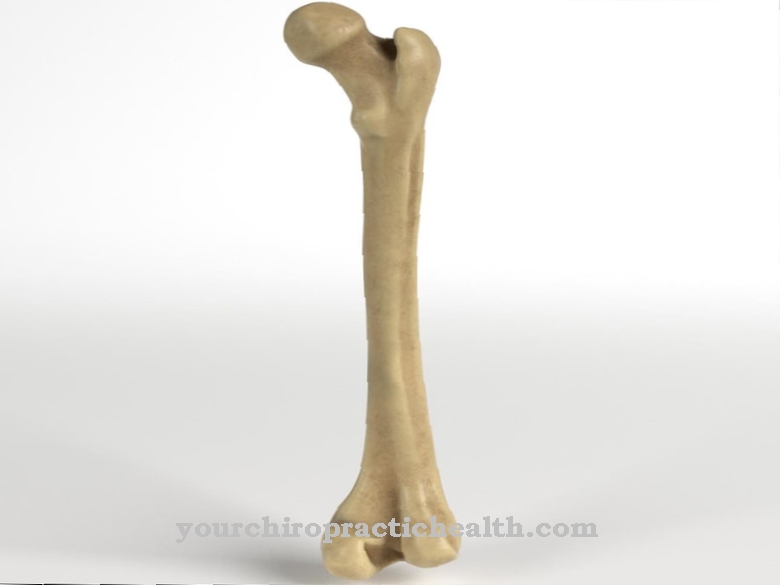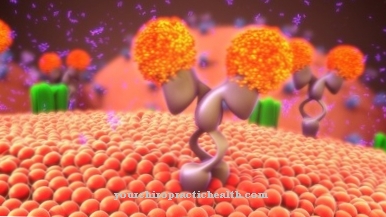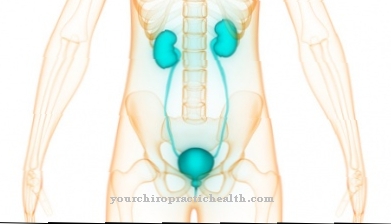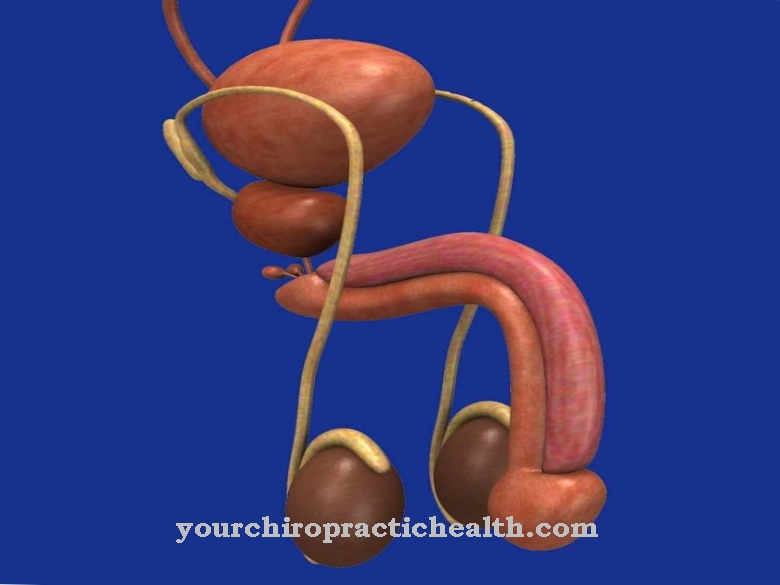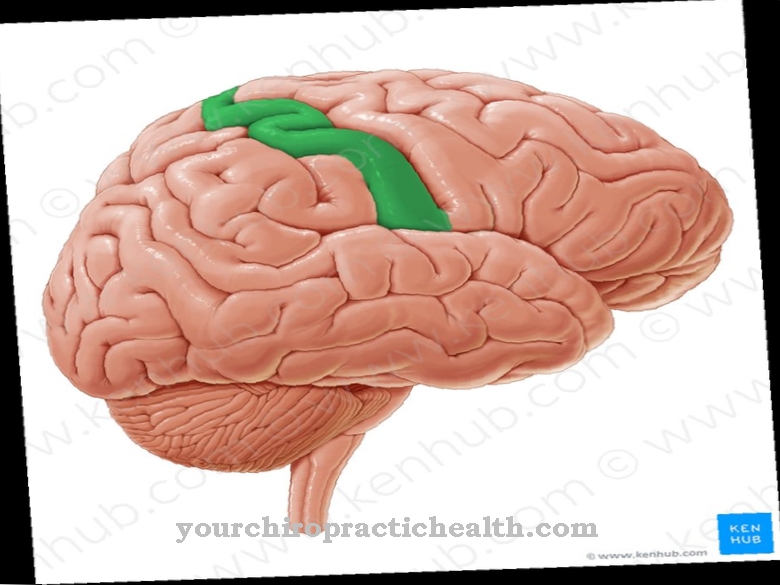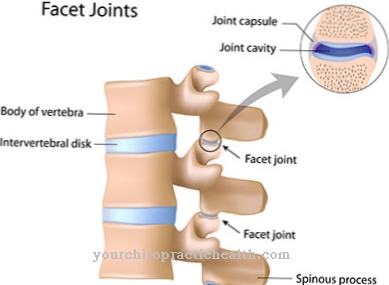In which HELLP syndrome it is a serious complication during pregnancy. It can have life-threatening consequences for mother and child.
What is HELLP Syndrome?

© Tomsickova - stock.adobe.com
HELLP syndrome is a hypertensive disorder and occurs during pregnancy. The term HELLP syndrome is made up of the English terms for the three main symptoms: These are H for Hemolysis (hemolysis), EL for Elevated Liver Enzymes (increased liver values) and LP for Low Platelets. This means that the number of thrombocytes (blood platelets) is too low.
HELLP syndrome is a serious form of preeclampsia. To this disease, which is also called Poisoning during pregnancy or Gestosis is known, it occurs exclusively during pregnancy. The complication of pregnancy becomes noticeable through disorders of blood coagulation and liver function and high blood pressure. In addition, the urine shows increased protein levels.
causes
The triggering causes of the HELLP syndrome are still unclear. Only a connection with processes in the placenta is considered to be reliable. A signal is emitted from there that increases the blood pressure of the woman concerned. In some cases this can affect the kidneys. In addition, certain diseases seem to play an important role in the development of HELLP syndrome.
These are primarily hepatitis, immune system disorders and chronic high blood pressure. In addition, a tendency to blood clots and genetic factors can have a negative effect. According to another assumption, a hormonal imbalance is responsible for the HELLP syndrome. Prostaglandin E and thromboxane A play a part in this. These hormones, which belong to the group of prostaglandins, are tissue hormones that are principally produced in all body cells.
While prostaglandin E dilates the blood vessels and has an inhibiting effect on blood clotting, thromboxane A ensures the narrowing of the blood vessels and promotes blood clotting. If the relationship between the two hormones is disrupted, this results in negative changes in blood clotting.
Symptoms, ailments & signs
Symptoms of the HELLP syndrome can occur in just a few hours. The first signs of the disease are the swelling of the face and limbs, severe pain in the right upper abdomen, which is particularly severe when touched, visual disturbances, nausea, vomiting and a general feeling of illness, which increases rapidly. In addition, more protein is excreted in the urine.
In addition, the pregnant woman's blood pressure increases to values of over 190/110 mmHg. However, some symptoms are often weak or do not occur at all. Problematically, swelling, nausea, and vomiting are widespread during pregnancy, so they do not provide any concrete information.
In the worst case, however, the symptoms of HELLP syndrome can have life-threatening effects on both mother and child. As a rule, HELLP syndrome develops in the last trimester of pregnancy. It mostly shows up during the 34th week of pregnancy (SSW).
Diagnosis & course
If HELLP syndrome is suspected, a diagnosis must be made as soon as possible. For this reason, the pregnant women concerned are immediately admitted to hospital. There the attending physician first establishes the patient's medical history.
Existing pre-existing conditions such as diabetes mellitus, chronic high blood pressure, kidney diseases and previous stresses within the family are important.
Certainty about the presence of the HELLP syndrome can only be obtained through laboratory tests. As part of the diagnosis, the blood coagulation parameters and liver values are determined. In addition, various examinations are carried out to control the course of the disease, such as a sonography (ultrasound examination) of the uterus.
The course of the HELLP syndrome is considered questionable. If hemolysis progresses, there is a risk of massive anemia. Internal bleeding is also possible. The longer the HELLP syndrome lasts, the greater the risk of damage to the liver cells. Particularly dangerous complications are the detachment of the placenta and acute kidney failure.
Complications
HELLP syndrome can cause serious complications and discomfort for the child and mother during pregnancy. In the worst case, both the mother and the child die. This primarily leads to a general feeling of illness in the mother, with the face swelling. You will continue to experience visual disturbances and vomiting with nausea.
These complaints extremely reduce the patient's quality of life. There is extreme pain in the upper abdomen, which mainly occurs when it is touched. In many cases, HELLP syndrome is diagnosed late because the symptoms and symptoms are not unique to this disease. Without treatment, however, the syndrome can have very negative effects on the child's health. Internal bleeding and kidney failure may continue to occur. In this case, the affected person is dependent on dialysis.
Treatment of HELLP syndrome is usually not possible. For this reason, the birth has to be carried out earlier, which in most cases leads to discomfort and complications. No general prediction about the success of the birth is possible. The child may not be born completely healthy.
When should you go to the doctor?
Since the HELLP syndrome in the worst case can lead to both the death of the mother and the death of the child, medical treatment and examination should always be carried out. As a rule, a doctor should be consulted if the pregnant woman's face swells significantly or if there is severe pain in the upper part of the abdomen. Furthermore, visual disturbances or nausea with vomiting can indicate the HELLP syndrome and should be examined by a doctor.
Since these symptoms can occur during pregnancy even without HELLP syndrome, an examination is recommended if they occur. High blood pressure can also indicate this symptom. First and foremost, the pregnant woman should see a gynecologist. This can determine the HELLP syndrome. In acute emergencies or in the case of very severe complaints, however, the hospital or the emergency doctor should be called. Early diagnosis and treatment can save the life of the child and mother.
Doctors & therapists in your area
Treatment & Therapy
The therapy for HELLP syndrome depends on when the disease occurs. If it shows up after the 34th week of pregnancy, the birth of the child must be initiated. On the other hand, if the syndrome occurs before the 32nd week of pregnancy, the doctors delay the birth process as long as possible. This is urgently needed for childhood to mature. With the help of medication, the mother's blood clotting and blood pressure should be stabilized.
A controlled lowering of blood pressure is important to prevent damage to the placenta. For this reason, a CTG check is always carried out in which a special contraceptive recorder checks the mother's contractions on the one hand and the child's cardiac activities on the other. A delayed delivery can only be carried out if the blood coagulation values, blood pressure and liver values have normalized again. The later the birth can be initiated, the higher the child's chances of survival.
To support lung maturation, the child also receives cortisone or cortisone-like preparations. In order to enable rapid intervention in an emergency, mother and child are monitored around the clock. If the HELLP syndrome is only mild, it is sometimes possible to wait without initiating the birth. However, strict controls of the mother's blood pressure and blood values are important.
Outlook & forecast
The HELLP syndrome is a serious complication during pregnancy and can lead to serious consequential damage. Close medical monitoring of mother and child is necessary in order to be able to intervene quickly in an emergency.
First of all, the pregnant woman can develop severe anemia with all symptoms. This often means that internal bleeding cannot be ruled out, as the number of platelets drops dramatically. At best, this bleeding is so minimal that it goes unnoticed, but it can also lead to bleeding with symptoms.
The longer the HELLP syndrome lasts, the more damage to the pregnant woman's liver cells progresses. As a result, more or less large hematomas form under the liver capsule, which can usually be seen well on ultrasound. In an emergency, this leads to a rupture of the liver, which requires immediate surgery and can be life-threatening. The HELLP syndrome can also lead to severe kidney damage and even acute kidney failure.
All this affects the unborn child at most through the necessary medication and surgical interventions in the mother. It becomes dangerous for the baby if the placenta detaches prematurely as a result of the HELLP syndrome. This can happen not only during childbirth, but also unexpectedly in the course of pregnancy.
prevention
In order to be able to recognize the HELLP syndrome in good time and treat it accordingly, prenatal care should be carried out consistently. This is done by regularly measuring blood pressure, checking urine output and examining kidney and liver functions.
Aftercare
In most cases, the measures and options for follow-up care for HELLP syndrome are severely limited. Here, the person concerned is first dependent on a quick diagnosis and subsequent treatment in order to prevent further complications. In the worst case, the child or the mother can die, so that the HELLP syndrome focuses on the early detection of the disease.
As a rule, there are hardly any aftercare options, as the further course depends heavily on the birth of the child. Regular examinations of the child and mother are necessary to properly monitor the situation. After the birth, the child is mostly dependent on taking medication.
Parents must ensure that the dosage is correct and that it is taken regularly. Regular checks by a doctor are also necessary after the birth. Parents depend on the support of family and friends to prevent psychological upsets or depression. The loving care and support has a positive effect on the course of the disease. Whether the HELLP syndrome will lead to a reduced life expectancy for the child or the mother cannot generally be predicted.
You can do that yourself
The HELLP syndrome is always a medical emergency that requires immediate medical treatment. If poisoning is suspected, a hospital is to be visited immediately, as there is a real risk to life for both the mother and the child. Independent treatment that is far from conventional medicine is strongly discouraged. Otherwise there is a risk of an unnecessary worsening of the situation, which can lead to irreversible damage to health.
In the majority of cases, the only way to save mother and child lives is to deliver the baby by caesarean section. However, this does not yet lead to an interruption of the HELLP syndrome. Often times, the climax occurs only after the birth has been initiated. The importance of comprehensive aftercare is all the greater.
In addition to the physical care of mother and child, mental care must also be considered. Because often psychological after-effects can still be seen years later in the affected woman. Psychotherapeutic support helps to process the traumatic experience, to avoid long-term impairments and to cope with everyday life.


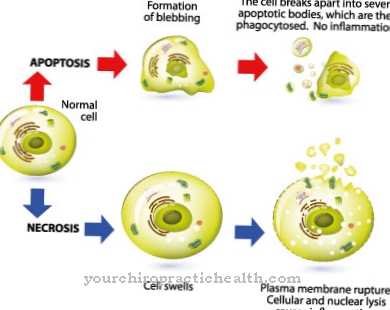
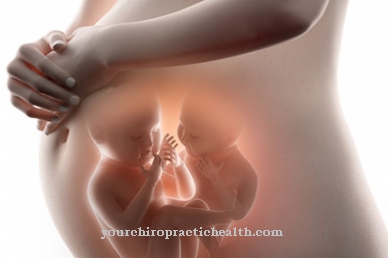

.jpg)


.jpg)



